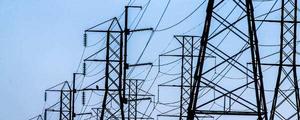PRINCETON, NJ -- The majority of Americans, 56%, say President Barack Obama is doing a good job of protecting the nation's environment, while less than half say the same about his handling of national energy policy (42%) or his success in making America prosperous (43%). Except for a slight increase this year in perceptions that Obama is doing a good job of making America prosperous, these ratings have been fairly flat since 2010.
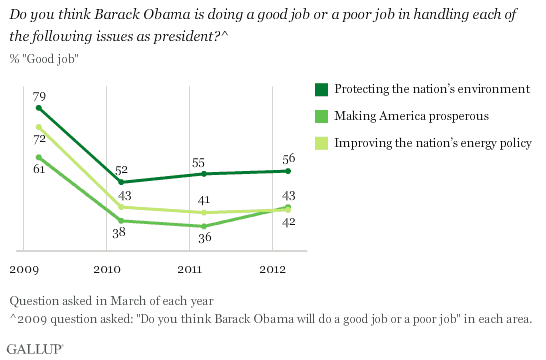
The new ratings are based on Gallup's 2012 Environment poll, conducted March 8-11.
All three of Obama's issue ratings are sharply lower than what Gallup found in March 2009, when Americans were asked to predict whether Obama would do a good or a poor job in each area. Expectations were quite high for him at that time, particularly in terms of the environment and energy. From that perspective, Obama's current ratings on energy are the weakest relative to expectations (30 percentage points lower). That compares with a 23-point support-versus-expectations gap on the environment and an 18-point gap on prosperity. At the same time, Obama's overall job approval rating descended from the lower 60s in March 2009 to the mid- to high 40s in March of each subsequent year.
George W. Bush's ratings on the same issues in 2004 -- his re-election year -- were even lower than Obama's are today. In March 2004, 41% of Americans said Bush was doing a good job of making America prosperous as well as protecting the environment, and 34% praised him for his energy policy. All three evaluations worsened over the course of Bush's second term, coincident with the decline in his overall job approval rating.
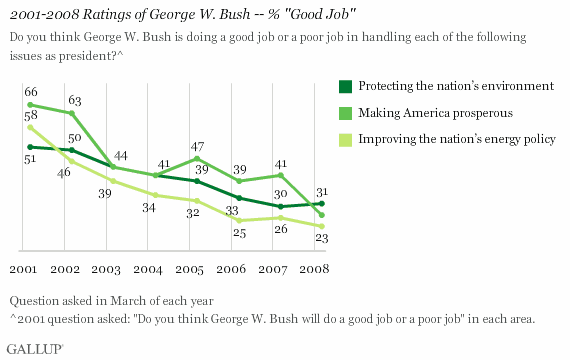
Independents' Views Similar to National Average
Obama's ratings on the environment, energy policy, and fostering prosperity show predictable partisanship, with Democrats widely believing he is doing a good job on each, and Republicans, a poor job.
Independents' views are similar to the national averages, with the slight majority praising Obama's job performance on the environment. The slight plurality or majority of independents are critical of his performance on energy and national prosperity.
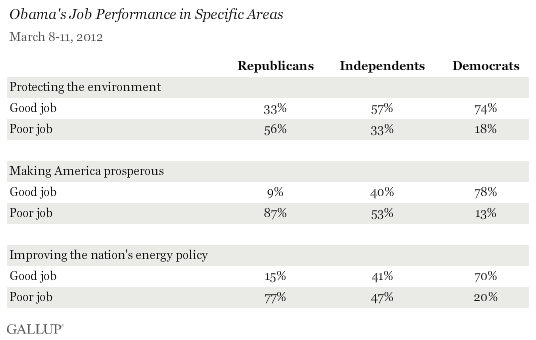
Ratings of Obama's Energy Policy Fairly Stable
Obama's rating on improving the nation's energy policy has particular significance right now as he is striving to address consumer anxiety about rising gas prices by focusing on his long-term plans for conservation and alternative "clean energy" solutions. At the same time, Obama faces significant political cross-pressures on the proposed Keystone XL pipeline. Environmentalists are fiercely opposed to the project, while Republicans in Congress, as well as the general public and some unions, endorse it.
Not only is Obama's overall rating for doing a good job of improving the nation's energy policies unchanged from a year ago, but his ratings on the issue from each party group have also been fairly stable. There has been a slight increase in the percentage of independents saying he is doing a good job, and a slight decrease among Republicans, but neither of these changes is statistically meaningful.
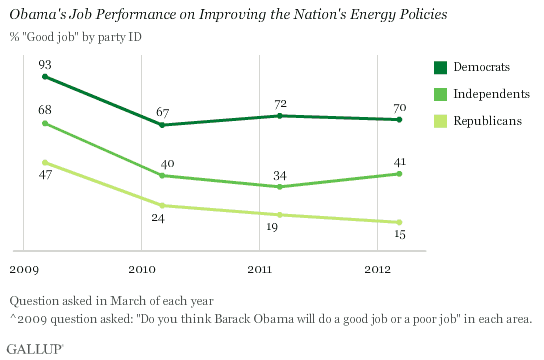
Bottom Line
Americans' views about Obama's performance on the economy, energy policy, and American prosperity have been fairly stable at the present levels since a year into his presidency. That a solid majority says he is doing a good job on protecting the environment is a positive for him. Obama's standing on the economy and energy policy is more problematic for him, given that barely 4 in 10 Americans say he has done a good job on each, and roughly half, a poor job.
George W. Bush's ratings on the same issues either were no better or were worse at the same point in his presidency, yet he won re-election. This may provide some reassurance for Obama. Still, Obama's ratings on the economy and energy are significantly below the high expectations Americans had for him in 2009. And, the imbalance between Americans' ratings of him on the environment and on energy could suggest he is vulnerable to Republican claims that he has pursued environmental goals at the expense of U.S. energy independence -- a position somewhat out of step with the current even split in Americans' preferences for the environment vs. energy trade-off. At the same time, Americans do favor conservation and pursuing alternative energy sources over increased development of fossil fuels.
Explore President Obama's approval ratings in depth and compare them with those of past presidents in the Gallup Presidential Job Approval Center.
Survey Methods
Results for this Gallup poll are based on telephone interviews conducted March 8-11, 2012, with a random sample of 1,024 adults, aged 18 and older, living in all 50 U.S. states and the District of Columbia.
For results based on the total sample of national adults, one can say with 95% confidence that the maximum margin of sampling error is ±4 percentage points.
Interviews are conducted with respondents on landline telephones and cellular phones, with interviews conducted in Spanish for respondents who are primarily Spanish-speaking. Each sample includes a minimum quota of 400 cell phone respondents and 600 landline respondents per 1,000 national adults, with additional minimum quotas among landline respondents by region. Landline telephone numbers are chosen at random among listed telephone numbers. Cell phone numbers are selected using random-digit-dial methods. Landline respondents are chosen at random within each household on the basis of which member had the most recent birthday.
Samples are weighted by gender, age, race, Hispanic ethnicity, education, region, adults in the household, and phone status (cell phone only/landline only/both, cell phone mostly, and having an unlisted landline number). Demographic weighting targets are based on the March 2011 Current Population Survey figures for the aged 18 and older non-institutionalized population living in U.S. telephone households. All reported margins of sampling error include the computed design effects for weighting and sample design.
In addition to sampling error, question wording and practical difficulties in conducting surveys can introduce error or bias into the findings of public opinion polls.
View methodology, full question results, and trend data.
For more details on Gallup's polling methodology, visit www.gallup.com.
